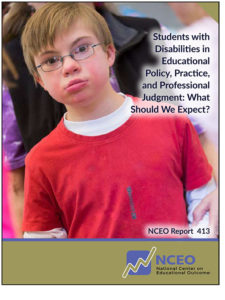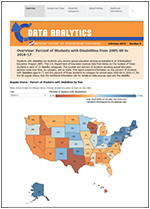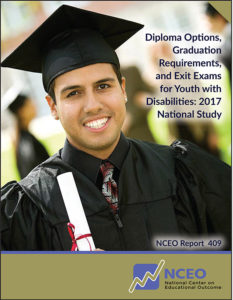Welcome
NCEO sends its greetings for a wonderful spring and summer. In this issue, we highlight sessions in which NCEO will participate during the upcoming National Conference on Student Assessment in Orlando, Florida. We also highlight recent NCEO reports, including two that address expectations for students with disabilities—one a longer report that examines what we know in the context of policy, practice, and evidence from the implementation of reforms (Students with Disabilities in Educational Policy, Practice, and Professional Judgment: What Should We Expect?); and the second a brief that provides suggestions for policymakers, states, and technical assistance providers (Revising Expectations for Students with Disabilities). A new Data Analytics that provides national and state trends on students with disabilities and their categories of disability also is highlighted. A report that updates state graduation policies for students with disabilities concludes the NCEO reports highlighted in this issue. We conclude this issue by summarizing a new report from the DIAMOND Project, Additional Educators’ Perspectives on Classroom Implementation of Accessibility Features and Accommodations.
– Martha Thurlow, NCEO Director
NCEO at the National Conference on Student Assessment
![]() The 2019 National Conference on Student Assessment (NCSA) will be held in Orlando, Florida on June 24-26. NCEO staff members will participate in several sessions. See the article for the full list.
The 2019 National Conference on Student Assessment (NCSA) will be held in Orlando, Florida on June 24-26. NCEO staff members will participate in several sessions. See the article for the full list.
Expectations for Students with Disabilities
 NCEO provides a cross-disciplinary introduction to topics in educational policy, practice, and law that have highlighted critical questions related to expectations for students with disabilities in the report Students with Disabilities in Educational Policy, Practice, and Professional Judgment: What Should We Expect. Also, NCEO published the Brief, Revisiting Expectations for Students with Disabilities, summarizes some of the past exclusionary practices applied to students with disabilities that resulted in low expectations for these students, along with how they were addressed in policies related to standards-based reform.
NCEO provides a cross-disciplinary introduction to topics in educational policy, practice, and law that have highlighted critical questions related to expectations for students with disabilities in the report Students with Disabilities in Educational Policy, Practice, and Professional Judgment: What Should We Expect. Also, NCEO published the Brief, Revisiting Expectations for Students with Disabilities, summarizes some of the past exclusionary practices applied to students with disabilities that resulted in low expectations for these students, along with how they were addressed in policies related to standards-based reform.
Longitudinal National and State Trends in the Numbers of Students with Disabilities and their Primary Disability Categories
 A new online interactive report, Percent of Students with Disabilities by Disability Categories for 2005-06 to 2016-17 (Data Analytics #8), shows the number and percent of K-12 students receiving special education services from 2005-06 to 2016-17, both nationally and for the 50 regular states. Viewers can select a number of different ways to look at the data in this report.
A new online interactive report, Percent of Students with Disabilities by Disability Categories for 2005-06 to 2016-17 (Data Analytics #8), shows the number and percent of K-12 students receiving special education services from 2005-06 to 2016-17, both nationally and for the 50 regular states. Viewers can select a number of different ways to look at the data in this report.
Updates on State Graduation Policies for Students with Disabilities
 NCEO’s report, Diploma Options, Graduation Requirements, and Exit Exams for Youth with Disabilities: 2017 National Study, examines the results of a national study on the status of state graduation policies and diploma options for youth with disabilities. State policies and perceptions of intended benefits and possible unintended consequences are summarized and compared to the findings of a previous study by Johnson, Thurlow, and Schuelka (2012).
NCEO’s report, Diploma Options, Graduation Requirements, and Exit Exams for Youth with Disabilities: 2017 National Study, examines the results of a national study on the status of state graduation policies and diploma options for youth with disabilities. State policies and perceptions of intended benefits and possible unintended consequences are summarized and compared to the findings of a previous study by Johnson, Thurlow, and Schuelka (2012).
Perspectives of Educators on Classroom Implementation of Accessibility Features and Accommodations
 The DIAMOND project has released another report about educators’ perspectives on classroom implementation of accessibility features and accommodations, Additional Educators’ Perspectives on Classroom Implementation of Accessibility Features and Accommodations. The report describes a second cohort of educators who participated in phone interviews in three of DIAMOND’s nine project state. In addition to providing detailed information on the responses of the 34 educators, the report provides summaries of the perspectives of all 74 educators’ in the two cohorts.
The DIAMOND project has released another report about educators’ perspectives on classroom implementation of accessibility features and accommodations, Additional Educators’ Perspectives on Classroom Implementation of Accessibility Features and Accommodations. The report describes a second cohort of educators who participated in phone interviews in three of DIAMOND’s nine project state. In addition to providing detailed information on the responses of the 34 educators, the report provides summaries of the perspectives of all 74 educators’ in the two cohorts.
NCEO’s National Assessment Center is supported through a Cooperative Agreement (#H326G160001) with the Research to Practice Division, Office of Special Education Programs, U.S. Department of Education. The Center is affiliated with the Institute on Community Integration at the College of Education and Human Development, University of Minnesota. The contents of this report were developed under the Cooperative Agreement from the U.S. Department of Education, but do not necessarily represent the policy or opinions of the U.S. Department of Education or Office within it. Readers should not assume endorsement by the federal government.
